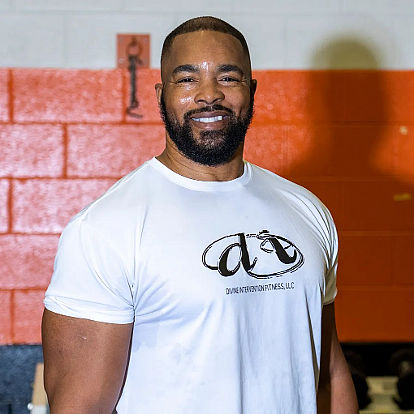The Health Divide: The ‘silent killer’ affects one in three Black men in the U.S.
Image

(Photo via Getty Images)
Published on
July 14, 2025
At first glance, 59-year-old fitness trainer Leonard Wilson appears to be in peak physical condition.
Standing 6’3” with 24-inch biceps, Wilson easily bench presses over 300 pounds and squats more than 400 pounds. You wouldn’t guess that Wilson, who is African American, has been living with high blood pressure since he was 19.
High blood pressure is often called the “silent killer” because it usually causes subtle symptoms that can be easily mistaken for other health problems. It’s also a chronic condition that disproportionately impacts African Americans due to a complex web of social factors ranging from housing segregation and racism to stress and diet. Ongoing federal cuts to environmental and public health programs, combined with reduced access to care following Medicaid cuts, are poised to worsen such disparities.
When Wilson learned he had high blood pressure, he was only a year removed from high school, he was married, and his wife was expecting their first child. At that time, he ate poorly. "I loved cake and ate it even when it wasn’t my birthday, and I also consumed a lot of fried foods and processed meats. I thought I was healthy because I played basketball and was young."
Wilson's blood pressure was so high when he visited his doctor that he was prescribed a medication for hypertension. It was the exact dosage his 70-year-old grandmother was taking. After starting the medication, Wilson's blood pressure dropped, but it caused him to experience erectile dysfunction. “I felt I was too young for that, and I was just married. I decided to stop taking it,” Wilson said.
The rate of high blood pressure among Black people in the United States is one of the highest in the world, affecting 55% of Black adults.
African Americans develop hypertension earlier on average. They also often face difficulties with medication adherence due to limited health care access, distrust of the medical system, and concerns about medications reducing their libido, making it a tough pill to swallow.
Image

Leonard Wilson (courtesy photo).
The reasons behind the disparity
Hypertension was common in Wilson's family. His grandmother had high blood pressure, and several uncles, cousins, and friends also suffered from this condition. However, it was rarely discussed. Because it was not a topic of conversation, there was no talk about how to lower blood pressure numbers other than relying on medication. As a result, Wilson felt that it was just something Black people had to deal with.
Several reasons have been cited for the disparity in hypertension.
There is a direct link between high rates of blood pressure and structural racism, according to the American Heart Association.
Chandra Jackson, a research investigator and epidemiologist at the National Institute of Environmental Health Sciences, defines “structural racism” as the various ways society fosters racial discrimination. This can occur through housing, education, employment, wages, and the criminal justice system.
For example, Jackson told the American Heart Association that decades of redlining have resulted in Black families being segregated into disadvantaged neighborhoods. These areas often have corner stores that sell junk food high in salt and fat rather than full-service grocery stores that offer fresh fruits, vegetables, and healthier food options.
Residents in these neighborhoods are also frequently exposed to lead from contaminated water pipes, as well as higher levels of noise and air pollution.
People living in such environments can experience a constant state of stress due to violence, which can significantly impact their health, Jackson said.
These neighborhoods often lack access to quality health care facilities and green spaces where adults can exercise and children can play. Additionally, discrimination in employment and educational systems contributes to higher levels of poverty, which in turn creates financial strain, housing and food insecurity, strained relationships, and limited access to health insurance.
Wilson, along with most of his family and friends, grew up on Milwaukee’s north side, an area that historically lacked resources. Now an advocate, he says many Black individuals discover they have issues like hypertension due to stress. They are often too overwhelmed to visit the doctor, too stressed to exercise, and too anxious to eat healthy — it takes effort and money to access fresh fruits and vegetables. When they are diagnosed with hypertension, they frequently struggle to adhere to their medication due to the ongoing stress.
According to the Mayo Clinic, hypertension affects 85 million people in the U.S., with one in three Black men suffering from the disease.
Wilson had to face his long-ignored hypertension after feeling dizzy one day and passing out at work. This event coincided with the heart attack and death of his best friend, Melvin Hughes, on February 22, 1999. Hughes was only 33.
“He had just gotten married and had a family, so I was devastated. We were the same age, so I knew I had to make some lifestyle changes,” Wilson said.
The loss was more troubling after Wilson learned that his friend also had high blood pressure. It was something neither man talked about.
Finding ways to reduce risk
After the death of his friend, Wilson made significant lifestyle changes. He adopted a disciplined workout regimen and a proper diet for weight loss, particularly for men dealing with high blood pressure.
The changes had a positive impact on him. Over time, his doctor observed improvements in his health numbers, and Wilson was eventually able to wean himself off the medication. Wilson and his doctor continue to monitor his blood pressure to check for any changes.
For journalists covering health, there is a lot of news to cover these days. But taking the time to share stories like Wilson’s can encourage meaningful conversations that raise awareness and understanding of hypertension and its disproportionate impact on communities of color. It is essential for people to recognize that they are not alone in their struggles and to know where they can find help and support.
Today, Wilson serves as a fitness and wellness coach for Black men in southeastern Wisconsin who suffer from hypertension and prostate cancer through the Milwaukee Recreation Program. He shares his story and his mantra: “Your mind is stronger than your body.”
Sexual health often comes up in discussions with the men in his class, and Wilson addresses this topic directly since it is something he has dealt with since he was 19. He tells them that with a proper diet, exercise and strategies to reduce stress, they can regain aspects of their health they may have lost.
“It’s tough because I know what they are going through, so I try to be an inspiration,” Wilson said.

